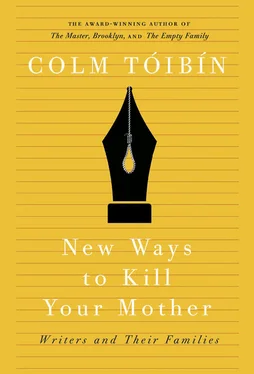It would really make sense to kill Lady Bertram, or to have her not there, allow her to be one of those unmentioned mothers in fiction, an unpalpable absence. But in that case, there will be no real impulse for Fanny to join her household rather than that of Aunt Norris and Fanny will miss daily contact with Edmund, who notices her and then doesn’t, thus releasing important dramatic energy in the book.
In patterning the book, in creating its dynamic and its dramatics, Austen has to have Lady Bertram there as a mother and not there all at the same time; she has to give her characteristics that are essentially neutral. She might have been easily amusing or irritating or silly like Mrs Bennet in Pride and Prejudice . Since her husband is away so much, she might have been given a more significant role. The pattern of Mansfield Park is essentially the pattern of the family. Even the outsider Henry Crawford comes armed with two sisters. When we look for the pattern of the book, we must therefore examine the dynamic of the family, the strange way power is held and withheld which allows the events of the novel to unfold and, more than anything, lets Fanny Price, so ostensibly dull and powerless and passive, emerge as deeply drawn and deeply powerful within the silence of her own consciousness. The novel gives her a sort of autonomy that she could not have were the pattern to be different; it allows her to move from being an outsider to taking over the narrative and, indeed, taking over generally.
Thus Austen has the ingenious idea of making the sofa, rather than the household, the realm over which Lady Bertram reigns, and making sleep, or half-sleep, her dynamic. She is too sleepy to care. When her husband is leaving for the West Indies, Austen writes: ‘Lady Bertram did not like at all to have her husband leave her; but she was not disturbed by any alarm for his safety, or solicitude for his comfort, being one of those persons who think nothing can be dangerous, or difficult, or fatiguing to anyone but themselves.’ While she thinks about her own comfort, she does not dwell too much on the subject. It defines what she does not do rather than any of her actions. She hardly has any actions. Austen writes: ‘Lady Bertram did not go into public with her daughters. She was too indolent even to accept a mother’s gratification in witnessing their success and enjoyment at the expense of any personal trouble…’ What Lady Bertram does in the book most of the time is not merely ignore others, but effectively ignore herself; she lives a gloriously underexamined life, so placing her in precisely the opposite force field to Fanny, who notices herself with considerable, almost intrusive, care, as though she were a little orphan novelist. Lady Bertram is lazy, has little to say, suffers from mild ill health. Her passivity and general lassitude play comically against her sister’s energy. But more than anything, the state of non-being, her presence as outline rather than line, her sheer inertia, her belief in the power of her own placid beauty, allow other forces in the novel — the venality of some of her children, Edmund’s sincerity — to happen, or have their effect, not because of their mother or their family or even despite the mother or the family; instead, naturally, organically, each character is given their own autonomy, thus allowing Mansfield Park to unfold as complex pattern. Lady Bertram, for example, is a loved figure in the book, but also comic. She is not merely interesting for the reader, she has a surprising way of attracting the other characters. In the centre of the book like a strange and insistent mass stands the consciousness of Fanny Price. She has no vivacity, no wit; she is mainly silent. She repels as much as she attracts. Trilling, for example, dislikes her, and writes: ‘Nobody, I believe, has ever found it possible to like the heroine of Mansfield Park . Fanny Price is overtly virtuous and consciously virtuous.’ This may be so, if we insist on looking at her from outside as though she were human. What is more important is that the novel is a register of her very essence. More than irritating virtue, this essence contains reason and feeling. She has a way of noticing and registering that has nothing to do with virtue, but everything to do with narrative impetus, holding the reader. It is uncertain how she will live in the book, thus filling the book with momentum.
For this momentum to happen, it is essential that she is taken away from her mother and put in the care of two aunts, neither of whom behaves in a way that is motherly. This gives her presence in the book a sort of density and strength. The idea of aunts in fiction in the nineteenth century is not merely to give the main character strength, however. It arises from a need that is more fundamental and displays the novel form itself as oddly hybrid and insecure and open to change and influence.
The novel is unsure whether it is a story, told by a single teller, or a play enacted by a number of actors. It is both static and theatrical in its systems, a sphere in which a single controlling voice operates, or many competing voices. The value of aunts in the dramatic structure of a novel is that they arrive and then they depart. They break up space and they add spice to things. Thus the arrival in Pride and Prejudice of Lady Catherine de Bourgh, Mr Darcy’s aunt, comes with a considerable new energy in the rhythmic tone of the novel as though it were being played out not for a single passive reader but for a large eager audience. It reads as follows:
One morning, about a week after Bingley’s engagement with Jane had been formed, as he and the females of the family were sitting together in the dining room, their attention was suddenly drawn to the window, by the sound of a carriage; and they perceived a chaise and four driving up the lawn. It was too early in the morning for visitors, and besides, the equipage did not answer to that of any of their neighbours. The horses were post; and neither the carriage, nor the livery of the servant who preceded it, were familiar to them. As it was certain, however, that somebody was coming, Bingley instantly prevailed on Miss Bennet to avoid the confinement of such an intrusion, and walk away with him into the shrubbery. They both set off, and the conjectures of the remaining three continued, though with little satisfaction, till the door was thrown open, and their visitor entered. It was Lady Catherine de Bourgh.
This idea of aunts arriving and then departing and the movement within the rhythm of the prose bearing signs of all this excitement makes its way through the novels of the nineteenth century. Chapter 7 of Book 1 of George Eliot’s The Mill on the Floss , for example, is entitled ‘Enter the Aunts and Uncles’, as though the page of the novel were a stage in a theatre. And in how she paints the four sisters, Mrs Tulliver, Mrs Glegg, Mrs Deane and Mrs Pullet, she moves between the comic and the serious using both dialogue and witty authorial observation; she uses the young Tom and Maggie Tulliver as observers, almost readers, almost audience, of the scene being worked out within the older generation. At stake here in this chapter is the idea of the family as a unit, as a united way of doing things, and how things will move and develop within this sense of tradition will become an important aspect of the novel’s pattern. This will be outlined in the simplest and most domestic way as Mrs Glegg remembers that in her ‘poor father’s time’, every member of the family arrived for meals at the same time. Soon when Mrs Pullet cries about the death of a neighbour, her sister argues with her in the name of family tradition rather than good sense: ‘ “Sophy,” said Mrs Glegg, unable any longer to contain her spirit of rational remonstrance, “Sophy, I wonder at you, fretting and injuring your health about people as don’t belong to you. Your poor father never did so, nor your aunt Frances neither, nor any o’ the family as I ever heared of.”’
Читать дальше












